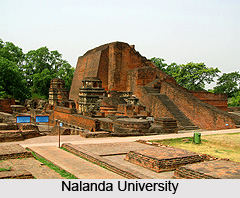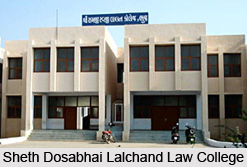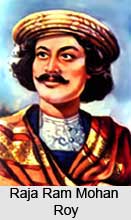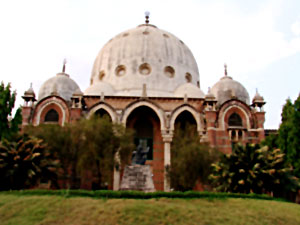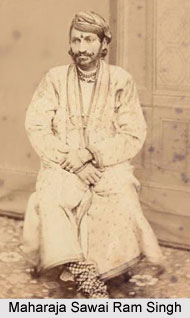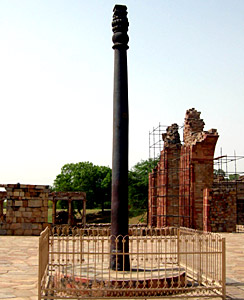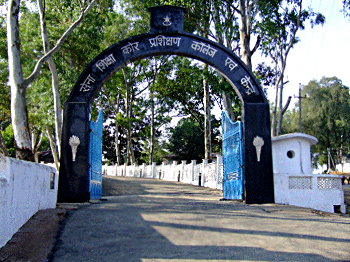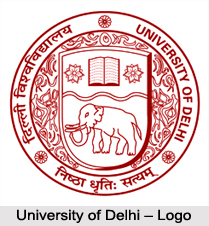 The University of Delhi, informally referred to as Delhi University (DU), is a public central collegiate university located in the national capital New Delhi, India. Established in the year 1922, it offers a total of 240 courses combined in the undergraduate (UG) and postgraduate (PG) levels as of 2016. The UG courses comprise Education, Computer Science, Engineering, Information Technology, Manufacturing Process and Automation Engineering, Biotechnology, Unani Medicine, Ayurveda, etc. totalling 87 while the PG courses, comprising Political Science, Sanskrit, English, Mathematics, Commerce, History, Chemistry, Philosophy, Economics amongst others, total 153. As of 2016, there are a total of 132,435 students registered under the university, with 114,494 undergraduates and 17,941 postgraduates. DU is ranked at 15 in college All India Rankings, with an AAAA+ National Rating. It is one of the most sought after institutions for higher education in India, falling under the universities with highest publication count in the country. The courses are mainly classified under the three faculties of the central university - arts, commerce and science. DU has grown into one of the largest universities in India. The motto of the University, in English, reads "Dedicated to Truth".
The University of Delhi, informally referred to as Delhi University (DU), is a public central collegiate university located in the national capital New Delhi, India. Established in the year 1922, it offers a total of 240 courses combined in the undergraduate (UG) and postgraduate (PG) levels as of 2016. The UG courses comprise Education, Computer Science, Engineering, Information Technology, Manufacturing Process and Automation Engineering, Biotechnology, Unani Medicine, Ayurveda, etc. totalling 87 while the PG courses, comprising Political Science, Sanskrit, English, Mathematics, Commerce, History, Chemistry, Philosophy, Economics amongst others, total 153. As of 2016, there are a total of 132,435 students registered under the university, with 114,494 undergraduates and 17,941 postgraduates. DU is ranked at 15 in college All India Rankings, with an AAAA+ National Rating. It is one of the most sought after institutions for higher education in India, falling under the universities with highest publication count in the country. The courses are mainly classified under the three faculties of the central university - arts, commerce and science. DU has grown into one of the largest universities in India. The motto of the University, in English, reads "Dedicated to Truth".
History of University of Delhi
The University of Delhi was established in 1922 as a unitary, teaching and residential university by an Act of the then Central Legislative Assembly of British India. Only 3 colleges existed in Delhi at the time: St. Stephen`s College founded in 1881, Hindu College founded in 1899 and Ramjas College founded in 1917. They were subsequently affiliated to DU. The university had modest beginnings with 2 faculties, Arts and Science, and about 750 students.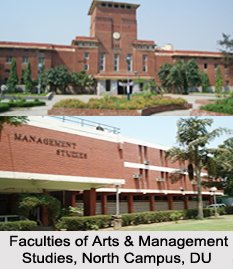
Soon after the seat of power was transferred from Calcutta to Delhi in British India in 1911, the Viceregal Lodge Estate had become the residence of the Viceroy of India, until 1933, when it was transferred to University of Delhi in October. Since then, office of the vice-chancellor and other offices are housed in this building. When Sir Maurice Gwyer came to India to serve as Chief Justice of British India, he was nominated as Vice-Chancellor of University of Delhi. Efforts of Sir Maurice brought numerous improvements in the University, including introduction of postgraduate teaching courses and establishment of laboratories. Realising the importance of a distinguished faculty to act as role models, Sir Maurice relentlessly hunted for talent all over the country and roped in men of eminence, such as Prof. Daulat Singh Kothari in Physics, Prof. T. R. Sheshadri in Chemistry, Prof. Panchanan Maheshwari in Botany and Dr. M. L. Bhatia in Zoology. Sir Maurice Gwyer, referred to as the "maker of university", served the post of vice-chancellor till 1950.
The silver jubilee of the University in 1947 coincided with India`s independence, and the national flag was hoisted in the main building for the first time by prominent economist V. K. R. V. Rao. The convocation ceremony for the year, however, could not be held due to partition of India. A special ceremony thus was held in 1948, attended by then Prime Minister Jawaharlal Nehru, Lord Mountbatten, Lady Mountbatten, Abul Kalam Azad, Zakir Hussain and S. S. Bhatnagar. 25 years later, the golden jubilee celebrations in 1973 were attended by then Prime Minister Indira Gandhi, Satyajit Ray, Amrita Pritam and M. S. Subbulakshmi.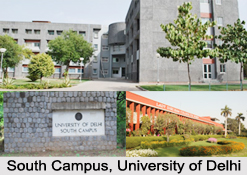
Courses offered by University of Delhi
A total of 240 courses (UG - 87 and PG - 153) are offered by the University of Delhi, with as many as 75 courses running under the 3-year undergraduate programme, few exceptions being M.B.B.S. B. Tech etc. and 70 postgraduate degrees. DU also offers M. Phil. in about 28 subjects. In addition, it offers 90+ Certificate courses and 28 Diplomas. There are also 15 Advanced Diplomas offered in various languages. DU offers PhD courses, which may be awarded by any faculty of university under ordinance VI-B. But, speciality and super speciality medical degrees like DM, DCh etc., can only be awarded by the faculty of medical sciences. Given the lack of surety in quality of legal education, The Bar Council of India issued a notification asking DU to shut down law courses offered in the evening shifts at its colleges.
As of 2016, there are overall 16 faculties and 86 academic departments in the DU, offering courses in a vast range of subjects and concentrations. The depth and breadth of the syllabus are vast, extending well beyond course offerings to many other special programmes and research opportunities. The honours programmes offered by the varsity, for a wide spectrum of subjects, are highly sought after by students from all over the country. Some of these faculties include Faculty of Applied Social Sciences & Humanities, Faculty of Arts, Faculty of Commerce and Business Studies, Faculty of Education, Faculty of Law, Faculty of Management Studies, Faculty of Medical Sciences and Faculty of Music and Fine Arts. Apart from 132,435 regular students as of 2016, there are 261,169 students in non-formal education programme, of which UG students make up 258,831 while PG students count 2,338. 5 departments namely Chemistry, Geology, Zoology, Sociology and History have been awarded the status of Centres of Advanced Studies. These Centres of Advanced Studies have carved a niche for themselves as centres of excellence in teaching and research in their respective domains. A good number of departments are receiving grants under the Special Assistance Programme of University Grants Commission (UGC), in recognition of their outstanding academic work.
The institutes affiliated under DU comprise 77 colleges scattered all over the city of Delhi, and 27 other institutes and centres, encompassing 3 specific Postgraduate Centres, 6 recognised institutes and 8 affiliated institutions.
Campuses of University of Delhi
The DU is segregated into 2 main campuses: the North Campus and the South Campus, housing its affiliated 77 colleges. The North Campus hosts the 3 founding colleges and 9 colleges geographically centred on the Faculty of Arts, Science and Law - Daulat Ram College, Hansraj College, Hindu College, Indraprastha College for Women, Kirori Mal College,Miranda House, SGTB Khalsa College, Ramjas College, St. Stephen`s College and Shri Ram College of Commerce. The campus also houses other centres and institutes of DU, including Cluster Innovation Centre, Delhi School of Economics, etc. The South Campus was started by DU in 1973, in an effort to cope with enormous expansion while continuing to maintain high academic standards and facilitating access for South Delhi residents. It moved to its present location on Benito Juarez Road, near Dhaula Kuan, in 1984, spread across 28 hectares (69 acres) of green, hilly terrain with buildings blending attractively with the natural surroundings. The various Departments are located in the Faculty of Arts and Interdisciplinary and Applied Sciences and S. P. Jain Centre for Management Studies.
The East Campus is being developed with the University College of Medical Sciences as its nucleus, while the West Campus will have its focus on Engineering and Technology, currently containing Faculty of Technology along with its affiliate, Netaji Subhas Institute of Technology, the university"s only top-tier engineering college.
Related Articles:
Indian Universities
Delhi
Higher Education in India
Colleges in Delhi
Academic Degree Courses in India
University Grants Commission
